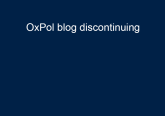My work on the use of poetry as a recruiting tool is discussed in a recent article in The Guardian. Here is an excerpt:
“Poetry may be a potent tool in recruiting militant jihadis, a new study by Oxford academic Elisabeth Kendall has found.
In Yemen’s al-Qaida and Poetry as a Weapon of Jihad, published in a new book, Twenty-First Century Jihad, she writes: “The power of poetry to move Arab listeners and readers emotionally, to infiltrate the psyche and to create an aura of tradition, authenticity and legitimacy around the ideologies it enshrines make it a perfect weapon for militant jihadist causes.”
Osama bin Laden composed an ode to the destruction of the USS Cole in 2000, which he recited at his son’s wedding, and a second example of his verse was discovered in an abandoned safe house in Kabul, having been distributed among trainee jihadis as an exhortation to fight.
“In the quest to understand the hearts and minds of those who practise militant jihad,” Kendall writes, “neglecting to interrogate the poetry that speaks to both would seem a fundamental oversight.”
Poetry is woven into life’s fabric for 300 million people in the Arabic-speaking world: in 2010 the language was spoken by around 4.5% of the world’s population and was the world’s fifth most-spoken language, after Mandarin, English, Spanish and Hindi. A reality TV programme, Millions Poet, broadcast from Abu Dhabi across the Arab region, has been dubbed Poetry Idol by commentators because it fills a similar role to Pop Idol in the west: the show gets more viewers in the UAE than the country’s national sport – football – and contestants are judged on the qualities of their poetry and their performance. The winner can leave with more than a million dollars.
…
Kendall’s research is based partly on data collected in conversation with 2,000 people in the sparsely populated but geographically huge Mahra region. Interviewees were asked about the significance of poetry in their lives, as part of a wider socio-economic survey conducted by the Mahra Youth Unity Organisation, an independent non-governmental body.
“The survey was conducted in December 2012 by local fieldworkers, men and women, face to face, to capture illiterate respondents of both genders. A startling 74% of respondents believed that poetry was either ‘important’ or ‘very important’ in their culture today,” she writes.
“Poetry was found to be very slightly more important among the desert tribes than along the more sedentary coast, among those in the poorest economic group and among those who carry a gun (a result that was not explained simply by any greater prevalence of guns in desert locations). Surprisingly perhaps, the presence of a television and level of education made no discernible impact, and the importance of poetry was only very weakly correlated to increased age. Finally, poetry was found to be more important among men (82%) than women (69%). This is not surprising, since it is the men who mainly recite at formal gatherings.”
To read the rest of the article, click here.






